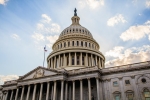Now that Donald Trump has emerged as the next president of the United States and the Republicans control the two houses, we want to share our thoughts about some of the key steps we expect a Trump administration will take and how they may impact Canada.

To develop our thoughts, we’ve used our in-house platform that uses artificial intelligence (AI) to gather and analyze information continuously on global socio-economic and geopolitical trends from a large number of sources. Using this platform, we focused on six areas where we believe there’s a relatively high likelihood a Trump administration supported by a Republican majority in the two houses could lead to significant deviations from the policies of the Biden administration.
We’ve also assessed the general impacts we expect a Trump administration could have on the economy and what businesses and governments should consider as they develop their strategies.
Actions expected by the Trump administration
Immigration
We expect one of the first actions of President Trump will be to severely limit immigration and act on undocumented immigrants who already reside in the United States. We believe this will lead to a significant reduction of labour supply, mainly in the manufacturing, retail, agriculture, construction and health care services, which will likely raise the cost of doing business in those sectors. Some of those undocumented immigrants may cross the border to Canada, with potential ramifications on the relationship between the two countries.
Trade policy
Another step President Trump will likely take shortly after his inauguration is to impose tariffs of 10% on some countries and a much higher tariff on China of up to 60%. We anticipate Canada may be exempted from such tariffs for products that qualify for duty-free status under the Canada-United States-Mexico Agreement (CUSMA). However, we do believe a plausible scenario could include the following:
- Targeted tariffs on various Canadian goods could be levied through executive order using different mechanisms, for example, Section 232 of the US Trade Expansion Act. This section provides the president the power to adjust imports, including using tariffs, if it’s found that excessive imports are a threat to US national security. We note that President Trump used this section in his previous term against steel and aluminum imports. If such tariffs are imposed on Canada, there’s a period of at least 60 days during which the United States and Canada would seek to negotiate an appropriate way forward. We note that the first 2.6 million vehicles Canada exports to the United States are fully exempt from this section.
- We expect that during 2025, Trump will use his ability to terminate CUSMA as a bargaining chip to obtain concessions from Canada ahead of the renegotiation of CUSMA scheduled for 2026. In that context, it should be noted that Canada’s top non-resource exports to the United States are all in the manufacturing sector, including vehicles, machinery, plastics, electrical equipment and aluminum.
- Softwood lumber, steel, aluminum and dairy products have been a sore point in United States-Canada trade relations, and we expect them to continue to be a focus of the new administration.
The fight against climate change
Trump and the Republican party don’t see the fight against climate change as a priority. As such, we expect a Trump administration will work with Congress to dilute or in some cases terminate legislation aimed at fighting climate change. For example, Trump has proposed rolling back several environmental regulations, including those related to emissions and coal ash cleanup. His campaign also suggested reducing the powers of the Environmental Protection Agency (EPA) and its budget.
While we don’t believe a Trump administration will revoke the Inflation Reduction Act, it is likely to dilute it, especially as it relates to electric vehicle (EV), EV battery, renewable energy, public transit and pollution controls. For example, it’s likely a Trump administration will roll back some or all of the tax credits available to US consumers when they purchase an EV that meets certain North American content rules. A less likely scenario, but not out of the realm of possibilities, would involve changes to the content rules that will disadvantage Canada and Mexico, while maintaining tax credits for US-produced EVs.
Oil and gas policy
Despite the high levels of oil and gas production we saw under the Biden administration, we expect Trump will aim to further enhance production by removing more regulatory barriers and opening additional areas for drilling. We also expect a Trump administration will be interested in enhancing oil and gas trade with Canada through increased production and new pipelines going north-south.
Tax policy
While Trump and the Republican party have promoted their intention to reduce income tax, Trump is on record that he won’t touch the big spending items of Medicare, social security and defence. It’s likely that tax legislation will be passed in the upcoming year that will extend certain personal and corporate provisions that are otherwise set to expire in 2025. This could increase the national deficit and debt and have a negative impact on the US global financial position.
Trump has also advocated for an additional reduction in the corporate income tax rate for domestic manufacturers, a rollback of some of the clean energy incentives included in the Inflation Reduction Act and increased tariffs on foreign-made goods. However, it’s unclear whether he’ll be successful in implementing such policies due to a slim majority in Congress. Moreover, given the debt position of the United States, reducing taxes will be challenging, as it may lead to a financial crisis.
Foreign and defence policy
A Trump administration helped by Republican control of the two houses is expected to turn the United States more inward. This suggests commitment to the North Atlantic Treaty Organization (NATO) might decline, forcing other NATO countries to increase funding and activity levels. Canada will likely find itself under tremendous pressure to increase its defence budget substantially and co-operate with the United States more closely in developing continental supply chains that decouple the United States from China (e.g. expedite the exploration and mining of critical minerals).
Possible impacts on the Canadian economy
The following is our assessment of some of the potential economic implications of a Trump administration.
Trump’s ascendence to power reflects, in part, the populist movement in the United States and other countries that is shaping the global political landscape—and with it the economy. The resulting shift in policy may extend beyond the term of the Trump administration and go beyond the United States, as other countries may follow its lead. Businesses should take note and consider its impacts when developing strategy.
Under Trump’s administration, we expect the movement of goods and labour globally will likely slow. This could lead to higher labour costs, inflation and cost of living. It could also raise the likelihood of a financial crisis in one or more Western governments, many of which are already carrying large debt loads and dealing with aging populations.
With decarbonization being deprioritized federally in the United States, tax incentives and regulations supporting the transition to a low-carbon economy will likely be diluted or, in some cases, eliminated over the next few years. This will reduce the demand in the United States for energy alternatives and EVs, and it will likely negatively impact Canadian companies operating in those supply chains. However, it should be noted that in some states, such as California, climate-related reporting requirements are increasing. As such, Canadian companies supplying to those states may find it easier to compete with US companies that would see a reduction or elimination of federal subsidies, such as those for renewable energy and EVs.
Changing approaches to immigration, free trade and climate change under this administration will likely encourage the development of various technologies, including those that reduce reliance on labour. With the reduction of subsidies related to the fight against climate change, there will likely be a shift by the private sector to technological solutions that are economically feasible and thus don’t require significant government support. In that context, nuclear energy and hydrogen may be looked at positively by a Trump administration.
Since Canada’s economy is intertwined with that of the United States and it’s not in possession of substantial intellectual property that provides it leverage, its ability to mitigate actions of the Trump administration that may affect it negatively will be limited. This suggests concessions will have to be made in areas of interest to the Trump administration. We expect that in the short term, Canada’s manufacturing sector faces the risk of a reduction in investment, as uncertainty, concerns about trade barriers and the slowdown in the fight against climate change in the United States will act as headwinds to this sector. On the other hand, the resource sector will likely see a revival, as efforts to decouple the United States from what it perceives as less reliable countries will be increased.
These trends will likely lead to a further decline in the Canadian dollar against the US dollar, which could reduce the cost of Canadian exports, thus making them more competitive. However, that could raise the likelihood of more trade barriers by the Trump administration.
We also expect a significant increase in Canada’s defence budget, as the Trump administration is likely to reduce its commitment to defend allies. It may use its economic leverage on Canada to push for increased defence spending, especially as it relates to the Arctic.
Depending on the size of the flow of undocumented immigrants from the United States to Canada, we may see a crisis in the relationship between the two countries that may affect trade negotiations. A substantial increase in government spending to deal with a large flow of immigrants could lead to higher inflation and interest rates.
We believe Canada’s response to these trends should be to increase productivity through a variety of tactics. These include increasing spending on research and development and developing an effective workforce planning and investment strategy to retain and attract the skilled professionals needed for economic growth.
This will provide Canada more economic freedom, reducing its exposure to events outside its borders.
Actions for Canadian businesses
How we can help
Our services
Deals activity in Canada in the second Trump era
Read our analysis of the key steps we expect a Trump administration will take and how they may impact the deals market in Canada.
Interested in how the US election results may affect your organization?
Contact us


























